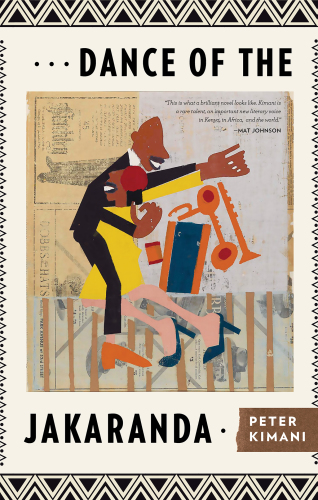
Dance of the Jakaranda
کتاب های مرتبط
- اطلاعات
- نقد و بررسی
- دیدگاه کاربران
نقد و بررسی

December 12, 2016
In his American debut, Kimani illustrates the discordant history of East Indians in Kenya through a fabulously complicated set of intriguing characters and events. One balmy night in 1963, a musician named Rajan is transfixed by the kiss of an ambiguously ethnic woman named Mariam, whose ethnicity seems ambiguous (Rajan himself is East Indian). He takes her home to his grandfather Babu, a meeting that “transcended any explanation other than fate.” Babu, it turns out, was a Punjabi laborer who first arrived in Mombasa in 1897 to build the railroad that “slithered down the savanna” under the direction of Mariam’s illegitimate English grandfather, commissioner McDonald. After a misunderstanding between the two men blossoms “into a grudge that would last a lifetime,” an intricate set of events comes to fruition with Rajan and Mariam’s relationship. The joy of Kimani’s storytelling is only rarely hampered by the unwieldiness of his plot; he alternates between the colonial past and the “season of anomie” that begins when an edict from the Big Man, who rules the newly independent Kenya and threatens “foreign nationals” (those whose heritage was English or East Indian) such as Rajan with deportation. Rajan’s understanding of himself as “a brown man in a black world which had been placed under white rule” fractures as surely as the nation itself does, sent reeling in the face of a “past that had finally caught up with the present to complicate the future.” Highlighted by its exquisite voice, Kimani’s novel is a standout debut.

December 1, 2016
African colonialism is confronted in this subtle, multilayered Kenyan tale.A "massive, snakelike creature whose black head, erect like a cobra's, pulled rusty brown boxes and slithered down the savanna": it's 1901, and the first train has arrived in Kenya's Rift Valley from the port of Mombasa. This is how Kimani (Before the Rooster Crows, 2004) opens this lyrical and powerful historical novel about his homeland. It's primarily the story of three men: the Master, Ian Edward McDonald, the Brit who built the railroad; Richard Turnbull, a preacher and friend of McDonald's; and Babu Salim, an Indian who helped build the railroad. Babu is also the grandfather of Rajan, a talented musician who now sings his songs in the Jakaranda Hotel, near where the railroad ends. Once a majestic monument to love that McDonald built for his wife, Sally, it fell to ruin--a "veritable heart of darkness"-- after she refused to live there, disgusted when she saw how McDonald brutalized the workers and servants. Through a series of flashbacks the lives of these three men "run parallel to each other for decades," finally coming together and unraveling in a "momentary clash" in the 1960s when Rajan is suddenly kissed in the dark hotel by a mysterious woman who then disappears. His obsession with her finally ends when he sees her on the dance floor and brings her onstage. Rajan and Mariam quickly develop a relationship; when he brings her to meet his elderly grandparents, she utters something to Babu, unleashing an unexplained curse dealing with ages-old illegitimacy and infidelity upon the family. Kimani weaves together a bitter, hurtful past and hopeful present in this rich tale of Kenyan history and culture, the railroad, and the men and women whose lives it profoundly affected. Despite an overly complex and loose narrative, this is a thoughtful story about a country's imperialist past.
COPYRIGHT(2016) Kirkus Reviews, ALL RIGHTS RESERVED.

February 1, 2017
Kenyan author Kimani, who currently teaches at Aga Khan University in Nairobi, holds a doctorate in creative writing and literature from the University of Houston and was commissioned by NPR to compose a poem for Barack Obama's 2009 inauguration. Marking his U.S. debut, his latest novel is another accomplishment he can add to his list. Set on the cusp of Kenya's independence, it focuses on the lives of three men and their multigenerational, multicultural connections during a volatile time in the nation's history. The main protagonist, Rajan, is a musician who sits at the intersection of the upheaval. When he starts dating a beautiful white woman, Miriam, they enjoy the youthful bliss that accompanies young love, but as tensions rise and secrets of their small town are revealed, both are thrown into a world that shatters their innocence. The characters are human, teaching us that even someone who does wrong is not all bad, and Kimani writes with such vivid detail that one can easily visualize the vast scenery. VERDICT Reminiscent of Iman Verjee's Who Will Catch Us as We Fall, this novel will appeal to readers of historical and literary fiction.--Ashanti White, Fayetteville, NC
Copyright 2017 Library Journal, LLC Used with permission.

December 15, 2016
Kenyan journalist and author Kimani's novel explores the lives of three men living during the British colonization of Kenya. Following narrators at the turn of the twentieth century and in the 1960s before Kenyan independence, Kimani's descriptive and inventive prose recounts personal stories of love and tragedy within a context of racial hierarchies and the fallout of colonial rule. Nightclub singer Rajan is besotted with a mysterious woman who kisses him during a blackout. Her appearance provokes flashbacks to his grandfather Babu's time building the railroad across Kenya with a team of Indian and African men. Babu and his wife, Fatima, both from Punjab, struggle with a new country, a curse, and infidelity. Babu's story feels weighted by history in a way that will remind readers of Gabriel Garcia Marquez's work. White Brits Ian McDonald and Reverend Richard Turnbull provide counter-perspectives as the colonizers and enforcers of strict racial divisions. Kimani's complex novel will leave readers questioning the meanings of citizenship and belonging during an era of significant social upheaval in Kenya's history.(Reprinted with permission of Booklist, copyright 2016, American Library Association.)

























دیدگاه کاربران